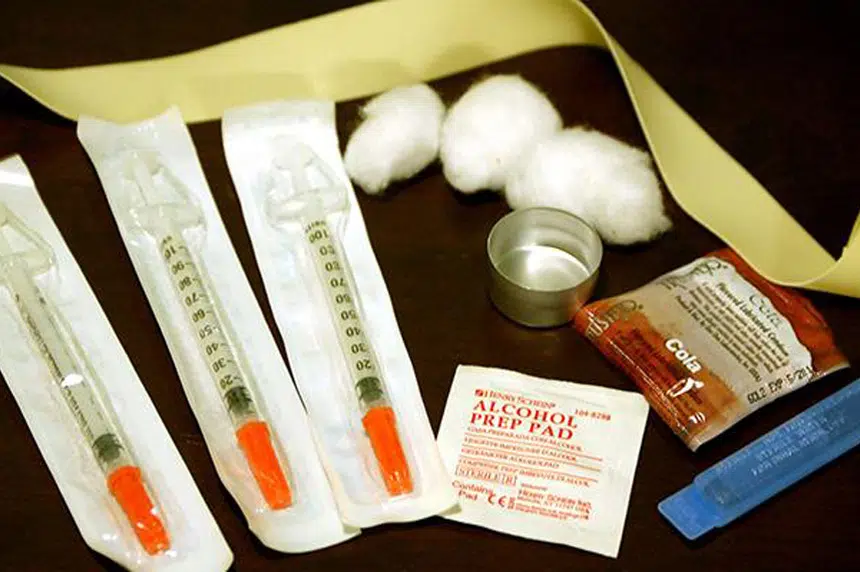Now that 2020 is in the rearview mirror, we’re learning more about the deadliest overdose year on record in Saskatchewan.
The Saskatchewan Coroners Service provided an update Monday to the public, outlining 379 confirmed or suspected overdose deaths from Jan. 1 to Dec. 31 of last year.
In Saskatoon, community groups such as EGADZ are seeing the issues firsthand through their outreach programs.
On Tuesday, EGADZ executive director Don Meikle described what its workers have observed.
“What we’re seeing out on the streets is people with mental health (problems). Mental health is really coming to the (forefront) right now with all the isolation. They can’t get out,” he explained.
“Services that people can normally access, a lot of it is expected to be virtual and a lot of people don’t deal well with the virtual. I think for a lot of these people it just exacerbates that whole feeling of loneliness and isolation.”
Meikle said people who are living high-risk lifestyles or are addicted to drugs have to get a sense of feeling from those from whom they’re accessing help. That’s something he believes is extremely hard to do from a distance.
“Even in our organization and our housing and the work that we are doing, our critical incidences have quadrupled. People were OK for the first few months of this pandemic, but the longer it’s going, the more people are feeling isolated and the more people are feeling hopeless and it’s just adding to (the) enormity (of the) crisis situation,” he explained.
Meikle said in his 28-year career, he has never seen drugs so dangerous on the street than what they are now. He said people don’t know what they’re taking anymore when it comes to some of the drugs that are offered on the street level.
Clive Weighill is the chief coroner in Saskatchewan. The former Saskatoon police chief outlined what he is seeing from the statistical level in Monday’s report.
“It has taken a while, I think, for Saskatchewan to catch up to the rest of Western Canada,” he said.
“The numbers are up substantially over previous years which would indicate that we have a drug issue in Saskatchewan … The numbers that we’re seeing right now, they’re eclipsing all other non-natural deaths.
“It’s eclipsing things like motor vehicle collisions, drownings, all kinds of other unnatural deaths … We have a situation where that’s quite concerning for us,” he added.
Weighill said fentanyl leads the way in terms of Saskatchewan’s deadliest drug, but added it’s rare to see just one drug in someone’s system who has died due to overdose.
“You may see a combination; there might be some prescription drug mixed in with some fentanyl. There might be some methamphetamines with fentanyl. It might be methamphetamine, fentanyl and alcohol,” he said.
Midway through 2020, the way in which Saskatchewan reports overdose deaths was changed.
Weighill said it added in suspected cases for more accuracy, as officials consider some of the circumstances of the death.
“We take into circumstances of the past history of the deceased, what evidence was left at the scene, what paraphernalia, excess drugs (and) what people at the scene have said,” he said. “Maybe they were with some friends when the drug toxicity overdose occurred.
“So we put all those pieces together, and we usually have the toxicology report back within about three weeks. So we might not have a final autopsy done, we might not have the final investigation done, but if we have some toxicology results, got evidence to the scene that will lead us to believe that it’s going to be expected drug toxicity (death), then we would list it as such.”
As for Meikle, he described the times in which we live as “crazy,” and something we’re not “getting out of” anytime soon.
“I think we need to continue to work as a community to figure out ways to help our vulnerable population, to figure out, ‘Yeah, this year how many people have died of a drug overdose?’ It’s alarming, and there is things that we can be doing differently,” he said.
“A lot of me is hoping that it’ll level off or slow down — that old saying, ‘You create a better mousetrap to create a smarter mouse.’ Drug dealers and that are figuring out ways of getting people hooked and keeping them hooked. I’m really hoping as our world starts to open up, that people can reach out and get to places for help that they never could or they can’t right now. I have to remain hopeful and optimistic because right now, it’s really scary.”
— With files from 650 CKOM’s Caitlyn Lepp











